2022 年江苏苏州中考英语真题及答案
注意事项:
1. 本试卷共七大题,满分 100 分(不含听力口语 30 分)、考试用时 100 分钟;
2. 答题前,考生务必将自己的姓名、考点名称、考场号、座位号用 0.5 毫米黑色墨水签字
笔填写在答题卡和对应的位置上,并认真校对条形码上的准考号、姓名是否与本人相符合;
3. 答选择题必须用 2B 铅笔把答题卡上对应题目的答案标号涂黑,如需改动、请用橡皮擦
干净后、再选涂其他答案;答非选择题必须用 0.5 毫米黑色墨水签字笔写在答题卡指定的
位置上,不在答题区域内的答案一律无效,不得用其他笔答题;
4. 考生答题必须答在答题卡上、答在试卷和草稿低上一律无效。
第一部分完形填空(共 10 小题;每小题 1 分,满分 10 分)
请认真阅读下面短文,从短文后各题所给的 A、B、C、D 四个选项中,选出最佳选项。
Like most children growing up in the countryside, Mike loved being outdoors and
traveled around every inch of the area.
With a deep love of the land, he had a strong wish to ___1___ it. When Mike saw
rubbish floating in the rivers, he got ___2___ . He knew he had to do something.
While only in third grade, Mike started a group. Its purpose was to ___3___ the
countryside and teach other young people about pollution and its dangers.
But Mike faced a challenge. As he was ___4___, he found it hard to speak out
in public. However, with his mom’s help, Mike ___5___ dealt with his fear. He said,
“I took responsibility(责任)and did what needed to be done. When your heart is
into it, ___6___ will stop you.”
Mike worked hard to ___7___ his idea to the public. He handed out leaflets and
even appeared on radio and TV. His efforts paid off. He won ___8___ from several
thousand people. And his group collected and recycled more than 22,000 pounds of
rubbish.
Now as a college student, Mike’s ___9___ remains the same. He often says, “I
want to create a ___10___ life for my kids and grandkids. It’s beautiful countryside,
where I’m from, and I want my kids to see it like I see it.”
1. A. practise
B. protect
C. prepare
D.
provide
2. A. weak
B. tired
C. relaxed
D. angry
�
3. A. clean up
B. break into
C. set up
D. move
into
4. A. shy
B. sad
C. proud
D. polite
5. A. clearly
B. carefully
C. successfully
traditionally
6. A. anything
B. nothing
C. something
everything
7. A. accept
B. change
C. follow
D.
D.
D.
introduce
8. A. courage
B. victory
C. support
D. reward
9. A. wish
B. chance
10. A. busier
B. harder
C. luck
C. better
D. fear
D.
crazier
第二部分阅读理解(共 15 小题;每小题 2 分,满分 30 分)
请认真阅读下面短文,从短文后各题所给的 A、B、C、D 四个选项中,选出最佳选项。并在
答题卡上将该项涂黑。
A
�
11. If you are free on Sunday night, which concert can you attend?
A. Country music.
B. Folk.
C. Jazz.
D. Rock.
12. How much will Mr. Green pay if he goes to the country music concert with his
two kids?
A. £10.
B. £20.
C. £30.
D. £40.
13. Which date is suitable for modern jazz lovers?
A. June 23.
B. June 24.
C. June 25.
D. June
26.
B
On warm winter days, Yang Liheng, 89, enjoys sitting by the window and looking
through old photos. These photos bring him joy and happiness once more.
For Yang, one of the long-expected activities during the Spring Festival is to
take photos with family members. On the early morning of the second day of the Chinese
New Year when the whole family reunite, he would dress up and wait for the photo
�
to be taken.
Yang became a photographer in the late 1950s. With his camera, Yang recorded
the great changes of his hometown over time. “I had a painful childhood, but I got
a chance to be a photographer after the founding(成立)of the People’s Republic
of China.” Yang told Beijing Review. “I want to record, in the form of photographs,
the local customs, the scenes and people’s brave spirit of fighting against the
hard conditions here in my hometown.”
“I used to take pictures for everyone else, but seldom turned my camera at my
family members,” Yang said. “My grandson gave me the idea to record the growth
and development of my own family.” Taking family photos then became a tradition
for Yang’s family. Though now some of his grandchildren are working and living in
other cities, they try their best to return home during the Spring Festival and
prepare for the special moment.
Last year was an important year for Yang Liheng. Most of his photos were displayed
in Yinchuan to show the development of the area over the past sixty years.
14. What does Yang expect most during the Spring Festival?
A. Wearing new clothes.
B. Having a big dinner.
C. Taking a family photo.
D. Visiting his relatives.
15. What does the underlined word “reunite” in paragraph 2 mean?
A. Get separated.
B. Get much wealthier. C. Get improved.
D. Get
together again.
16.What is the main idea of paragraph 3?
A. When Yang was interviewed.
B. Where Yang learnt to take
photos.
C. Why Yang had a painful childhood.
D. What Yang recorded with his
camera.
17. What do we know about Yang’s family?
A. It is full of love.
B. It is full of mysteries.
C. It is a rich family.
D. It is having a hard time.
�
C
All aboard! Let’s take a ride on the world’s highest railway—the
Qinghai-Tibet Railway(青藏铁路). Sit back and enjoy the journey. Get ready for
the trip of a lifetime.
We’re leaving Qinghai Station. The scenery along the way is some of the wildest
in all of China. Keep your eyes open as we race through this beautiful land. You
might see a rare Tibetan antelope(藏羚羊)from your window.
Before we begin our journey, let’s learn about this amazing railway. It’s truly
one of the great engineering wonders of the 21st century. When it was completed on
July 1, 2006, the Tibet Railway set nine world records, including the world’s
highest railway at 5,072 metres above sea level, the world’s highest tunnel(隧
道)at 4,905 metres, and the longest tunnel ever built on permafrost(冻土).
As we travel higher, the air gets thinner and thinner. Soon there will only be
50 to 60 percent of the oxygen which we are used to breathing. But don’t be afraid.
Each rail car has two separate oxygen systems. One system spreads oxygen throughout
the train at all times. And each passenger can also get a personal oxygen mask just
like those used in planes.
Here are a few more things to think about as our train leaves the station. The
designers solved three main challenges when building this great railway. First, the
high altitude(海拔)made the task difficult because there was no enough oxygen.
Second, much of the railway runs across permafrost, a type of ground that keeps
changing as the weather warms and cools. Finally, the railway goes through some of
the most sensitive ecology(敏感的生态环境)in China. Great care was necessary to
make sure of the smallest possible influence on nature.
�
All three challenges were met, making our trip possible. All aboard! The train
to Tibet is leaving in fifteen minutes.
18. Where are the passengers?
A. On a bus.
B. On a train.
C. On a ship.
D. On a
plane.
19. How does the text show the railway is amazing in paragraph 3?
A. By telling a story.
B. By using a designer’s words.
C. By introducing its world records.
D. By comparing the present with
the past.
20. How many oxygen systems are there in each rail car?
A. One.
B. Two.
C. Three.
D. Four.
21. Which of the following increased the difficulty of building the railway?
A. The changing ground.B. The polluted air.
C. The dangerous animals. D. The
hot weather.
D
When I was little, I was really little. But my dream was big. I dreamed of being
a basketball player. I tried out for the teams at school, but I was never given a
chance.
As I got older, I did grow a little bigger, but not a lot bigger. On my 12th
birthday, I decided to try a new sport: running. I told Grandpa. “I’m going to
be an athlete.”
“Dave.” Grandpa began gently, “if you can’t be big, you can do something
big.”
I ran 12 miles on my 12th birthday. On my 13th birthday, I did it again, but
I added an extra mile. On my 14th birthday, I ran 14 miles. 15 on my 15th, 16 on
my 16th, and you guessed it—17 miles on my 17th birthday.
All this running inspired(激发)another big dream. Someday, I’d run the Boston
Marathon(波士顿马拉松赛). I told Grandpa about my decision.
“But, Dave, you haven’t trained for the marathon. Are you sure you’re ready?”
�
Grandpa asked. But he still promised to walk over and cheer me on.
I ran fast that day, But I fell at Mile 18 and was driven to the hospital. Later
that night, I called Grandpa and told him I failed.
“No,” he said calmly, “you didn’t fail. You discovered something.”
“I did?” I asked.
“Yes, you discovered that big dreams don’t just come true. They take work.
If you train and work hard, I promise to wait for you next year and cheer you on.”
I trained every day, running miles and miles. Sadly, just two months into my
training, Grandpa died. He wouldn’t be waiting for my second Boston Marathon. I
decided I’d run for him.
That day, I ran fast. “Keep going! You can do it!” His words filled my head
as I forced my legs to make each painful step. As I crossed the finish line, I threw
my arms in the air and cried, “Grandpa, we did it!”
22. Why did Dave fail to join the school basketball team?
A. He couldn’t run fast.
B. He didn’t work hard.
C. He was not tall enough.
D. He wasn’t a quick learner.
23. What does the underlined word “it” in paragraph A refer to?
A. Adding an extra mile.
B. Running on his birthday.
C. Training for the marathon.
D. Trying out for the basketball
team.
24. Which of the following words best describes Grandpa?
A. Creative.
B. Modest.
C. Generous.
D.
Encouraging.
25. What is the best title for the text?
A. Dream Big
C. Think Twice
B. The Boston Marathon
D. The Story of Grandpa
第三部分信息还原(共 5 小题:每小题 1 分,满分 5 分)
请认真阅读下面短文,从短文后的选项中选出能填入空白处的最佳选项,选项中有两项为多
余选项。
Every year, millions of birds are killed or hurt when they fly into buildings.
�
Why does this happen? ___26___ Birds are flying into windows and tall buildings that
are all covered by glass.
Many birds fly from one place to another. Most of the time, they live in the
wild, such as forests and wetlands. ___27___ They might see small trees and flowers
inside a window and want to rest on these plants. The birds do not know there is
glass between them and the plants. ___28___
Some birds fly at night. They use the moon and stars to help guide them in the
right direction. Tall buildings with lights on at night can confuse (迷惑) the birds.
___29___ The birds see the light, but they cannot tell that the light is coming from
inside a building. They fly toward the light and crash into a building. On many
mornings, there might be several dead birds lying on the ground.
___30___ Many office buildings now turn off their lights at night. This helps
reduce the number of birds that fly into buildings and it also helps save energy.
A. The answer is glass.
B. People are trying to solve the problem.
C. These birds have no idea what glass is.
D. As a result, they fly right into the glass.
E. In this way, they can avoid crashing into glass.
F. People don’t know how to deal with the problem.
G. This is a big problem, especially on foggy and rainy nights.
第四部分词汇运用(共 13 小题;每小题 1 分,满分 13 分)
第一节根据下列句子所给汉语注释或首字母,在答题卡标有题号的横线上,写出空缺处各
单词的正确形式,每空限填一词。
31. Suzhou is very attractive with different kinds of ancient _________(桥).
32. His parents hope he can follow his heart when he _________(选择)his job.
33. Asking questions is one of the _________(最容易的)ways to lead you to active
learning.
34. The Tiangong space station is the _________(骄傲)of all Chinese.
35. It’s necessary for teenagers to learn how to spend their pocket money _________
(明智地).
�
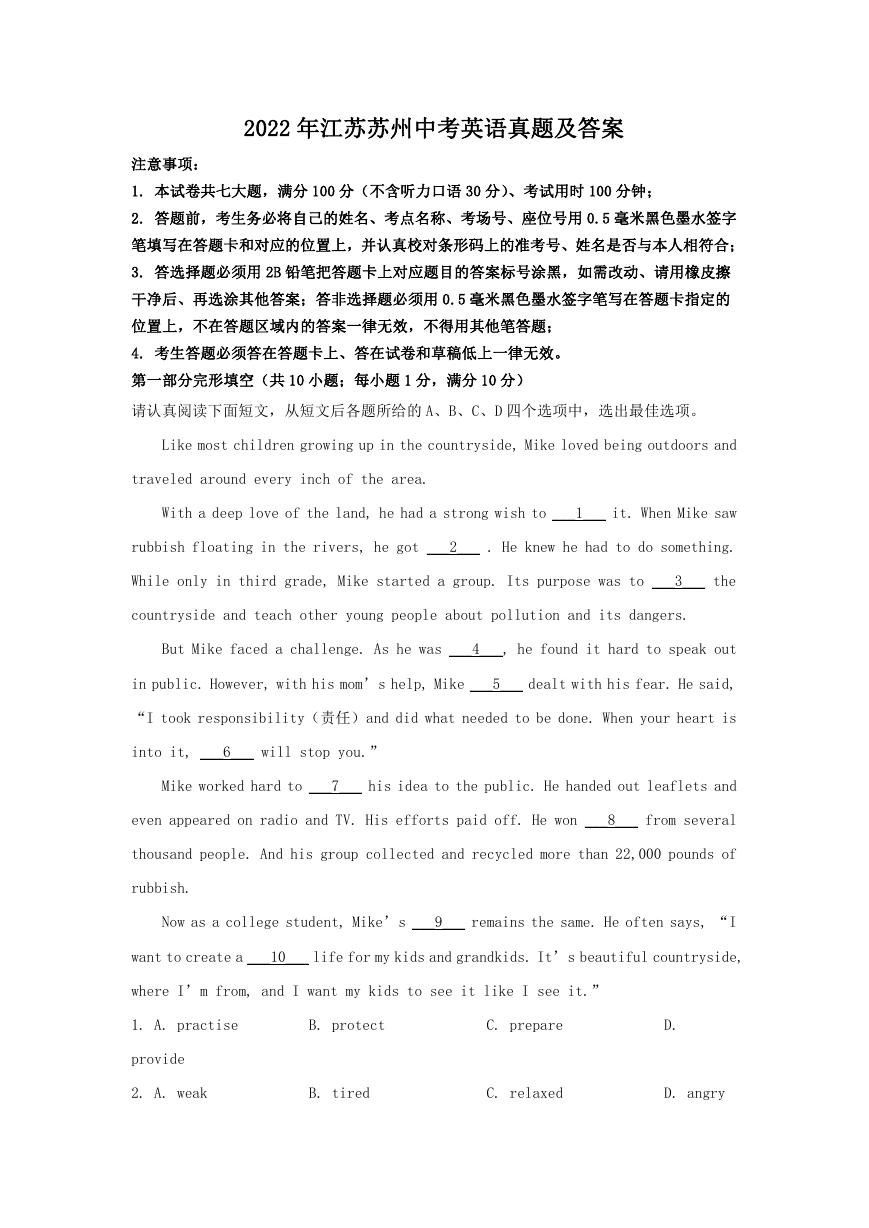
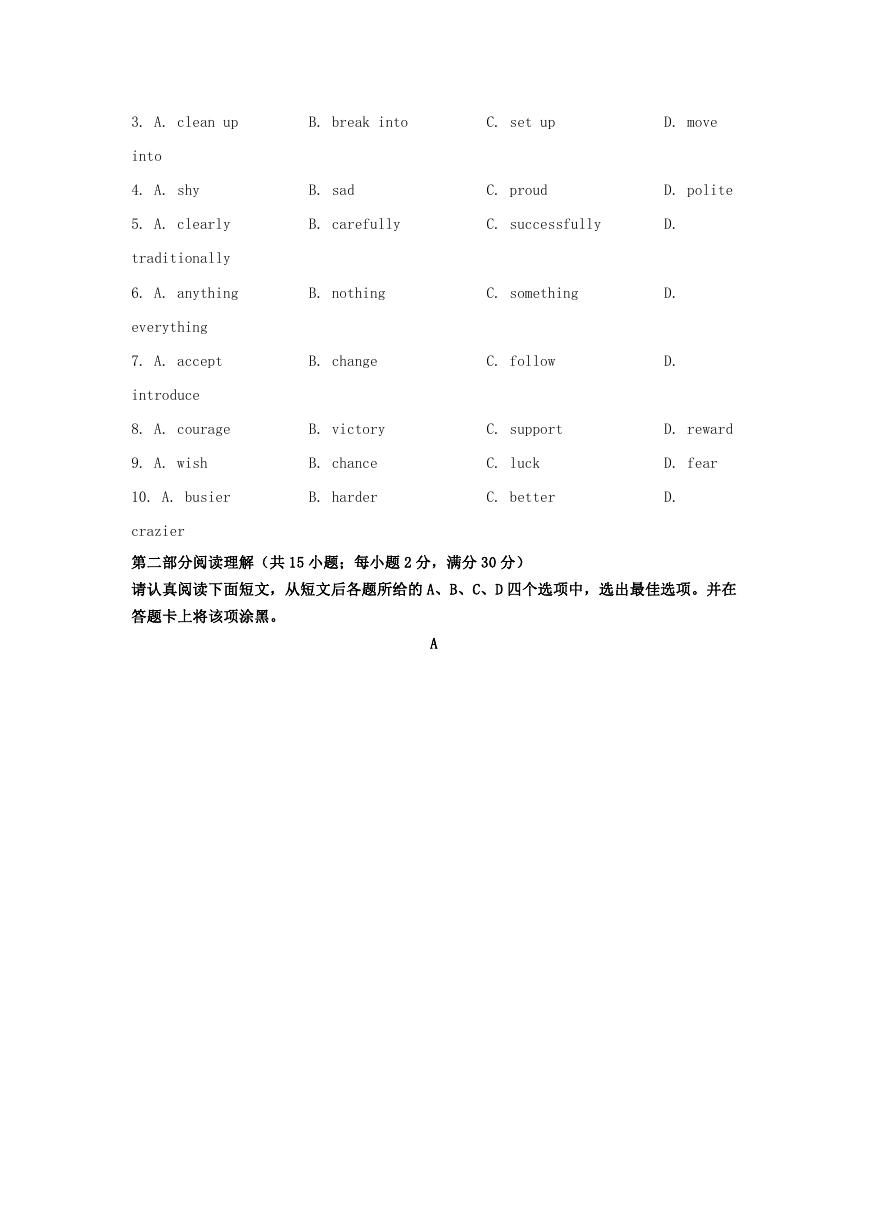
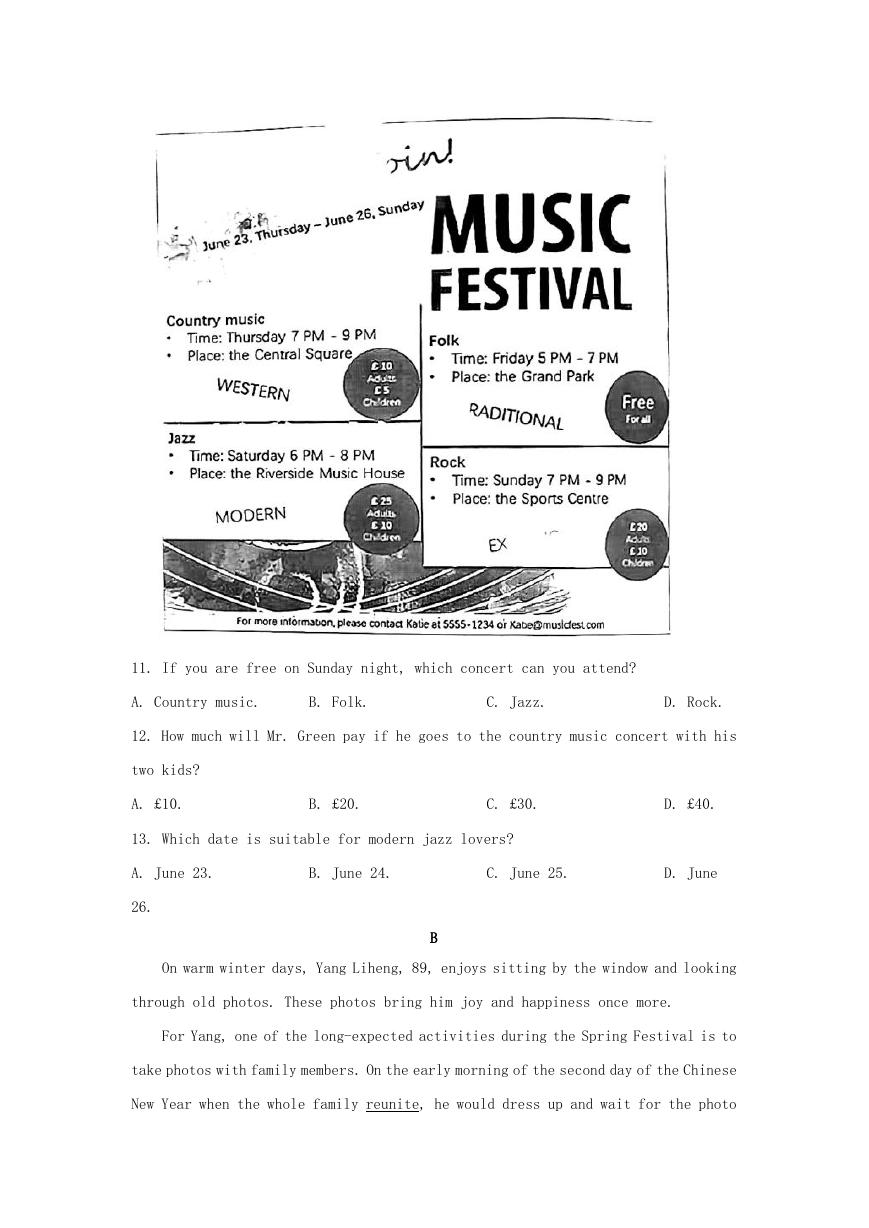

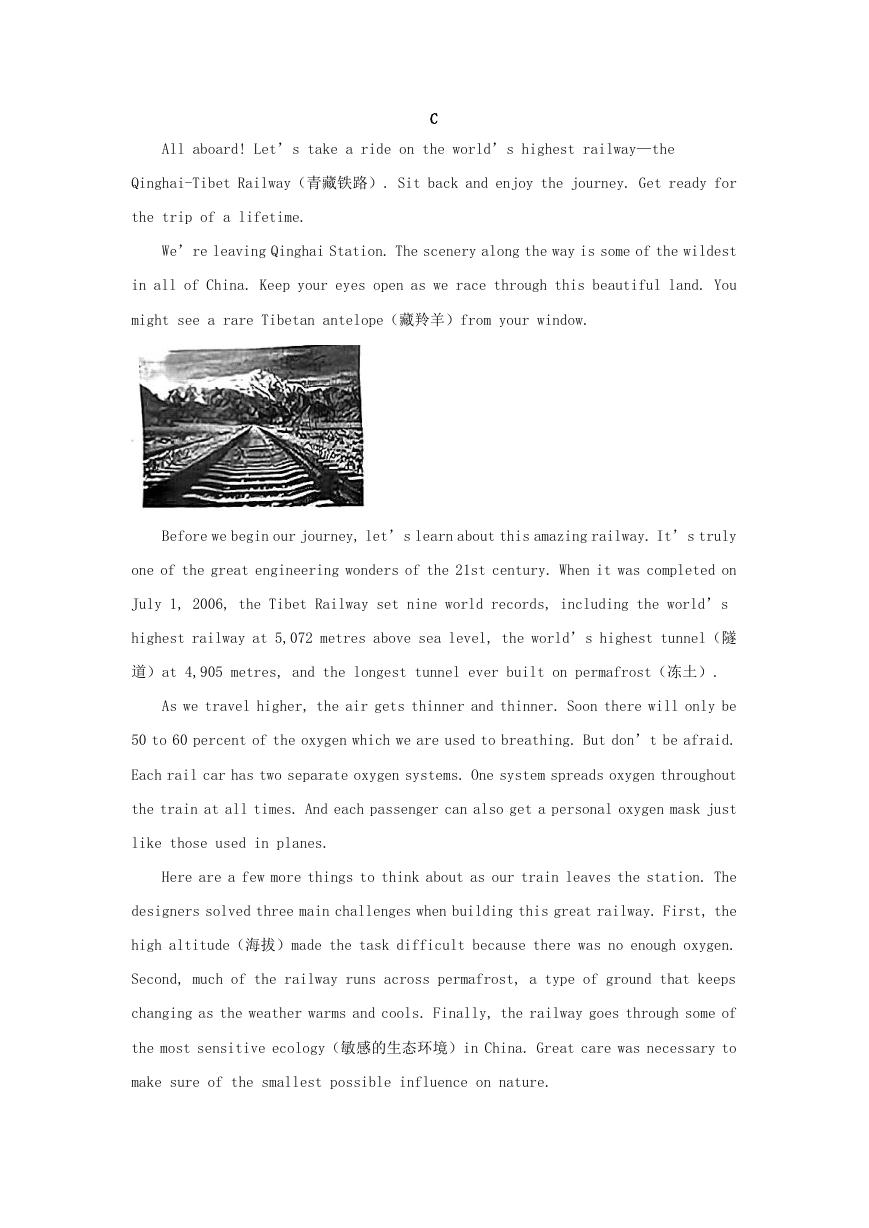
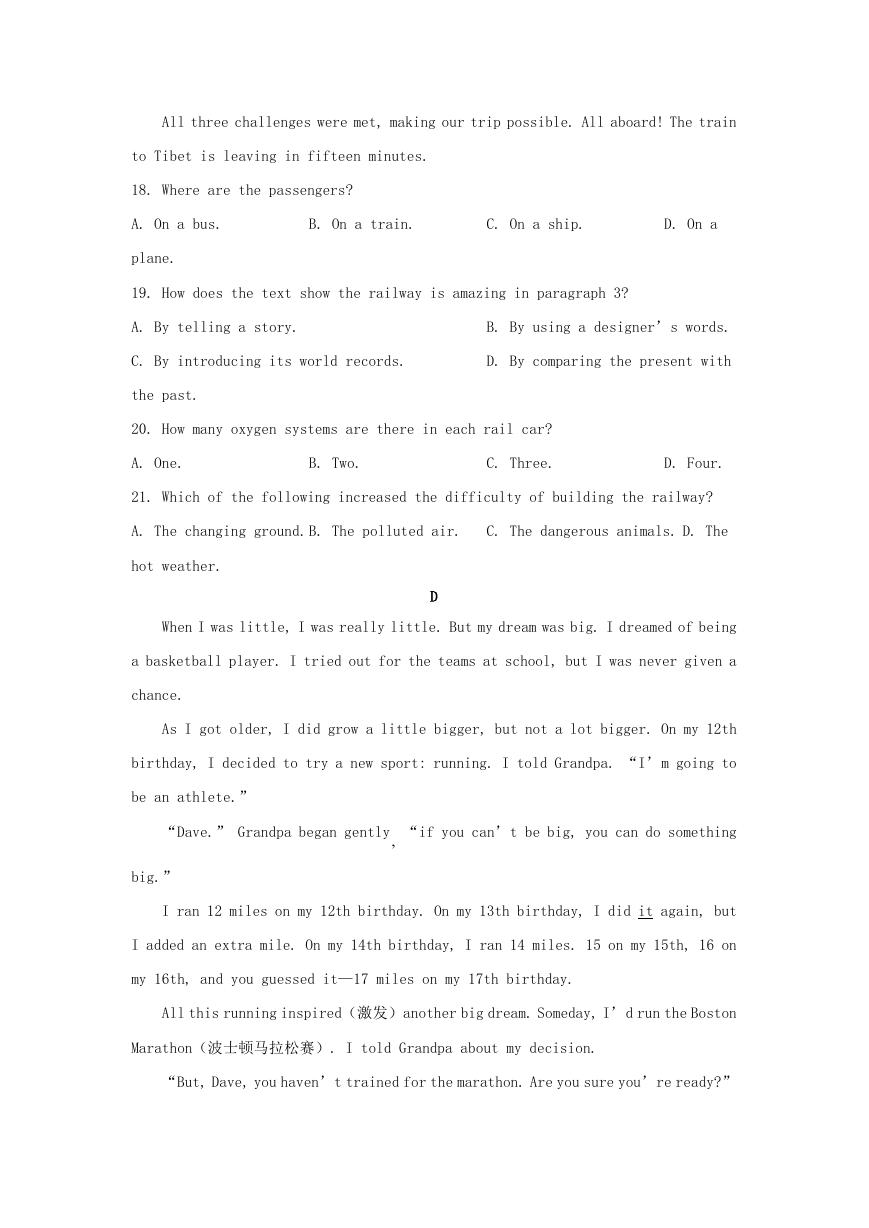










 2023年江西萍乡中考道德与法治真题及答案.doc
2023年江西萍乡中考道德与法治真题及答案.doc 2012年重庆南川中考生物真题及答案.doc
2012年重庆南川中考生物真题及答案.doc 2013年江西师范大学地理学综合及文艺理论基础考研真题.doc
2013年江西师范大学地理学综合及文艺理论基础考研真题.doc 2020年四川甘孜小升初语文真题及答案I卷.doc
2020年四川甘孜小升初语文真题及答案I卷.doc 2020年注册岩土工程师专业基础考试真题及答案.doc
2020年注册岩土工程师专业基础考试真题及答案.doc 2023-2024学年福建省厦门市九年级上学期数学月考试题及答案.doc
2023-2024学年福建省厦门市九年级上学期数学月考试题及答案.doc 2021-2022学年辽宁省沈阳市大东区九年级上学期语文期末试题及答案.doc
2021-2022学年辽宁省沈阳市大东区九年级上学期语文期末试题及答案.doc 2022-2023学年北京东城区初三第一学期物理期末试卷及答案.doc
2022-2023学年北京东城区初三第一学期物理期末试卷及答案.doc 2018上半年江西教师资格初中地理学科知识与教学能力真题及答案.doc
2018上半年江西教师资格初中地理学科知识与教学能力真题及答案.doc 2012年河北国家公务员申论考试真题及答案-省级.doc
2012年河北国家公务员申论考试真题及答案-省级.doc 2020-2021学年江苏省扬州市江都区邵樊片九年级上学期数学第一次质量检测试题及答案.doc
2020-2021学年江苏省扬州市江都区邵樊片九年级上学期数学第一次质量检测试题及答案.doc 2022下半年黑龙江教师资格证中学综合素质真题及答案.doc
2022下半年黑龙江教师资格证中学综合素质真题及答案.doc